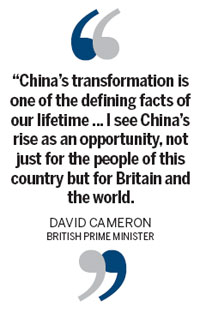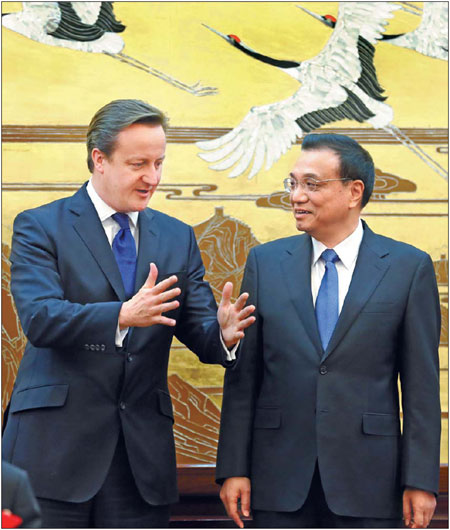Good beginning to a big opportunity
Updated: 2013-12-06 10:01
By Li Xiaokun in Beijing and Zhang Chunyan in London (China Daily Europe)
|
|||||||||||
British prime minister vows to be China's strongest advocate in the West
Reaffirming its commitment to be a firm supporter of China in the West and its desire to be a participant in its rapid economic growth, the United Kingdom has once again highlighted the growing importance of China in global affairs.
By opting to shun political rhetoric and focus more on trade ties during his visit, British Prime Minister David Cameron has clearly indicated that the relationship between the two nations is "indispensable".
"China's transformation is one of the defining facts of our lifetime ... I see China's rise as an opportunity, not just for the people of this country but for Britain and the world," Cameron said after his discussions with Premier Li Keqiang in Beijing.
The British leader added that there would be no limits on Chinese investment in Britain, and said he would personally champion a free trade area agreement between China and the European Union.
"Britain will be China's strongest advocate in the West," Cameron said after both sides signed 10 agreements on areas such as space exploration, and on increasing mutual investment.
Li told reporters that both sides had agreed to push companies for breakthroughs in high-speed railway and nuclear power collaboration.
Cameron also made a strong push for more investment by Chinese companies in the UK. In an article in the Chinese weekly news magazine Caixin on Dec 2, Cameron pressed his point.
"Put simply, there is no country in the Western world more open to Chinese investment, more able to meet the demands of Chinese consumers, or more willing to make the case for economic openness in the G8, the G20 and the European Union," he said.
"And there is no country more ready to forge a dialogue of mutual respect and understanding that can address issues of concern and advance our shared interests in the world."
Welcoming the UK initiatives, Li revealed that Britain supports China having shares and even holding controlling interests in British nuclear power projects.
In October, Britain signed a $26-billion (19 billion euros) deal involving China General Nuclear Power Group and China National Nuclear Corporation to build Britain's first nuclear plant in a generation, along with French energy giant EDF.
Cameron also urged more Chinese investment in British infrastructure, especially in the planned 43-billion-pound (51.7 billion euros) high-speed rail project linking London and the north of England.
"There is already Chinese investment in Heathrow Airport, in Manchester airport and of course in Hinckley Point Nuclear Power station," he told China Daily in London before the visit.
The two sides also held wide-ranging discussions on conducting offshore yuan business in London and Chinese banks opening branches in Britain.
London is trying to become the main offshore hub for trading in China's currency and bonds. According to the Society for Worldwide Interbank Financial Telecommunications, London accounts for 28 percent of offshore yuan settlement transactions.
Li added that Britain will increase its high-tech exports to China, and the two nations will establish an innovation and research fund of 200 million pounds.
Cameron said Britain would open a consulate in the central Chinese city of Wuhan, the country's fifth on the Chinese mainland. The UK will also simplify visa procedures for Chinese tourists and business travelers.
"Many Chinese tourists cut the UK out of their European trips because of the difficulties in applying for a British visa. It (procedure simplification) will be very convenient for Chinese tourists and benefit their economy too," says Tang Yiren, an associate consultant at a UK-based human resources company.
China-UK ties cooled after Cameron's meeting in May 2012 with the Dalai Lama. In May this year, Cameron said in Parliament that he had "no plans" to meet with the Dalai Lama.
Li said Cameron confirmed with him on Dec 2 that Britain respects China's territorial and sovereign integrity and core interests.

Duncan Freeman, a senior research fellow at the Brussels Institute of Contemporary China Studies, says Cameron is trying to develop both political and economic relationships with China. However, he says that any deal on free trade between the EU and China will be a long-term goal.
Rana Mitter, professor of modern Chinese history and politics at Oxford University, says that "British politicians on all sides of the political spectrum are now realizing the importance of China's markets."
He says the UK is China's second-most important European trading partner, after Germany, but the UK has a good opportunity to catch up.
"In the next phase of China's development, which will require financial service reform and investment in human capital, Britain has major advantages."
Ding Chun, director of the Center for European Studies of Fudan University, says the achievements in China-UK cooperation reflect a characteristic of the new Chinese leadership.
"They made it clear that China's cooperation with other countries should focus on complementary fields," Ding says.
According to Ding, the support for Chinese enterprises holding shares of UK nuclear energy firms "marks a breakthrough for China in the 'go global' process".
Tian Dewen, a European studies researcher at the Chinese Academy of Social Sciences, says London's position as an important global financial center is being challenged by Frankfurt, the financial center of the eurozone.
"As a result, the UK hopes the establishment of a renminbi clearing bank in London will help maintain its existing status," Tian says.
Cameron, who also visited the National Museum of China, was amazed by the huge collection of bronze ware, Buddhist figures and blue-and-white porcelain. Seeing the Houmuwu square cauldron, a cast bronze artifact from the Shang Dynasty (16th century to 11th century BC), Cameron expressed amazement at ancient Chinese civilization.
Cultural exchanges such as exhibitions can help the two people better understand each other, say experts, adding that Cameron's visit would inspire more British people to learn and understand Chinese culture.
Cameron also visited Shanghai and Chengdu during his three-day trip.
In Shanghai, Cameron witnessed the signing of a Memorandum of Understanding between several British companies and Alibaba, China's largest e-commerce group, a move that will help British firms use the digital platform to sell goods and services in China.
"I think Cameron's visit will result in even more partnerships for us across a variety of different industries for the mutual benefit of both countries," says Mark Johnson, a senior consultant at FleishmanHillard (China), a global communications firm.
Zhao Yinan, Mo Jingxi, Zhou Wa and Zhang Fan in Beijing and Wang Mingjie in London contributed to this story.
|
Chinese Premier Li Keqiang and British Prime Minister David Cameron chat at a signing ceremony in the Great Hall of the People in Beijing on Dec 2. They agreed to push for breakthroughs in high-speed railway and nuclear power collaboration. Wu Zhiyi / China Daily |
(China Daily European Weekly 12/06/2013 page9)
Today's Top News
Chinese-French voters seek louder voice
Trade surplus hit record high in Nov
Japan's secrets law raises fears
China allows rouble in border city
Gaokao reform removes English
'Two-child' rules to go from 2014
Institute keen to spread word
Cameron answers questions on Weibo
Hot Topics
Lunar probe , China growth forecasts, Emission rules get tougher, China seen through 'colored lens', International board,
Editor's Picks

|

|

|

|

|

|






